#fiction books worth reading
Text
🍂Now She Is Witch🍂 Review
Now She Is Witch by @kirstylogan Review
‘My great-grandmother’s toy house and my grandmother’s herb books. The owl shrieked under my window and I can still feel her beside me.’
A beautifully written story about the power women has (or don’t) over themselves. Let it be a simple choice from; What should I wear today? to the right of their own function and the choice and forge of their own fate and future with their wisdom that comes from the biggest goddess of all; Mother Earth.
I truly, truly highly recommend this book to everyone who needs some magic in their life or just a green light to finally be who they are. Kirsty Logan became one of the authors whose work I would definitely follow in the future and catch up on her past. A massive thank you to @tri.northern who brought these gems into my life. Like Tomorrow and Tomorrow and Tomorrow by Gabrielle Zevin. I can finally close 2022 with a satisfied sigh.
Out by @vintagebooks 12/01/2023
#NowSheIsWitch#books#amreading#bibliophile#book#bookstagram#book tumblr#bookish#reading#book aesthetic#booksbooksbooks#witchcraft#witches#healing#self healing#historical fiction#kirsty logan books#fantasy#fiction books worth reading#xmas reading
2 notes
·
View notes
Text
On expanding your vocabulary...
If you want to write, be well-spoken, become an orator, or someone who has a word to describe a person, place, event, or emotion, then you need to read and take notes of words you are not familiar with. I am reading two fiction books and here are words I have learned this week;
Sinecure - It describes a position that requires little or no work but gives high status and money.
Sacrosanct - Sacred, principled
Sardonic - It means mocking someone or speaking in a disdainful manner
Inchoate - It characterizes something that just begun and not fully formed
Inscrutable - Enigmatic, mysterious, impossible to understand
Morose - Ill tempered
Obsequiousness - Excessively obedient or attentive
Incongruous - You could mean something is out of place or ill matched
Incandescent - It characterizes someone as passionate or full of emotion
Languorous -It could mean when someone is slow or relaxed or tired
Sonorous - When a person's voice is deep or full
Abstemious - Not self indulgent when eating
#self improvement#self love#beauty#growth#classy#self development#mindfulness#education#self care#preppy#self control#self worth#self help#books and reading#booklover#bookworm#book review#books#fiction#educators#emotions#students#school#mindset#mind control#meditation#motivation
814 notes
·
View notes
Text
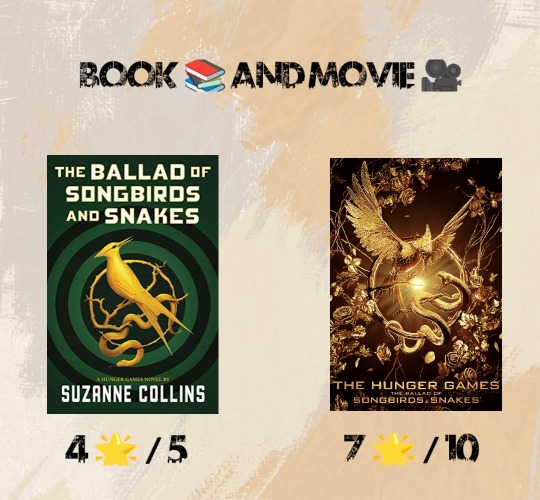
The ballad of songbirds and snakes.
Review :
- 📖 I was so immersed in the book, completely enjoyed it until the end which I didn't like so minus one 🌟
- 🎥 I really lovedddddd the cast, they were stellar but movie removed so many aspects from the book which were crucial part of the story Ughhhhhh!!
- the songs in both book and movie were beautiful✨🍂🍁
#2024#book lover#bibilophile#booklr#bookblog#bookrecs#sci fi books#young adult#the hunger games#the ballad of songbirds and snakes#you can't catch me now#booksbooksandmorebooks#book recommendations#book review#book to movie#movie review#viola davis#jennifer lawrence#lucy gray baird#coriolanus snow#katniss everdeen#katniss and peeta#rachel zegler#tom blyth#bookstagram#booktok books#book tumblr#books worth reading#dystopian fiction#books over people
11 notes
·
View notes
Text
scholastic book fairs allowing people to "opt out" of diverse books..... claiming it's either allow schools to "opt out" or not offer the books at all.... oh it's so over...
#the total backslide we are taking right now.#honestly this is the kind of shit that motivates me to write more#like i dont really think my work is anything special but#i remember reading birdland & how much that story meant to me at the time#which is wild now. i didn't get into interactive fiction for another 5 years. i didnt even know what that was at the time#and its like if my story can have that effect for even just ONE person it will be worth it#but seeing what kids have to deal with now...#the book banning has gotten so ridiculous and now you can just OPT OUT???????#just OPT OUT of entire groups of children. theyre not allowed to see themselves or their experiences anywhere#these people are all going to hell forever
9 notes
·
View notes
Text
i literally cannot for the life of me understand people who engage with fiction to insert their own familiarities into it. if I'm reading something that feels the same as what im used to i almost start feeling caged. the only time i really read things related to my experiences is to see someone articulate feelings i have better than i ever could because for the most part reading isnt supposed to be about your experiences its supposed to be about discovering others especially if you're privileged in the global north. i loved reading adiga's the white tiger precisely because i could compare the similarities and differences between the way class works in india and in the uk and possibly examine the way colonialism may have affected that. basically i think for the most part it is better to read in order to learn through fiction than it is to read for fun to be honest like read some fun books i dont care knock yourself out but like there have been bodies of work translated into your language from around the world and you can take advantage of that by broadening your mind with the help of a compelling story and if you turn that down well i think you're making the wrong call but that's just me. this is literally just a string of semi related ideas because its 1am but whatever
#and if you have to read any african novel read achebes things fall apart#< i hate when the book everyone says is going to be good is good because its like. called one of the great postcolonial novels and it is💥#also i should have made it clear these dont have to be different country experiences nor necessarily fiction to be compelling and also#worth learning from. like charrières papillon is personally a great insight into how fucked up the french penal system was until#way too recently. running french guiana like how the british ran Australia etc.
13 notes
·
View notes
Text
A Little Life by Hanya Yanagihara
Book Review - A Little Life by Hanya Yanagihara
Fiction Book Review
22 Jul
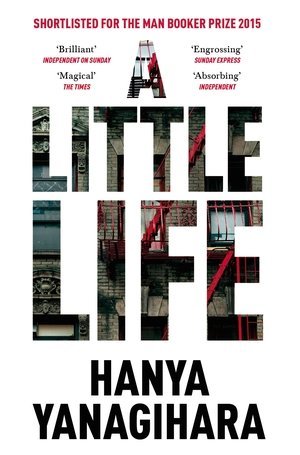
It's difficult to know where to start with a review of 'A little life'. If you've read it, you'll know what I mean. It's the story of four graduates who move to New York to make their way in life. Willem is an aspiring actor; Malcolm wants to be an architect but finds his job unfulfilling; JB is talented and trying to break his way into the art world; and Jude, an ambitious, brilliant lawyer, but deeply troubled.
We follow their lives over the decades, as their relationship with each other changes. They come together, drift apart, fall in and out of love and deal with addiction. But it's Jude with his body damaged by injury and childhood trauma, who is the centre of the book, both for his friends and the reader. Can he overcome his demons?
That's about as much as I can say in terms of an overview.

Yanagihara
I bought this book at the Sun bookshop in pre-pandemic Melbourne, December 2019. I had a gift voucher, so picked this and a couple of others and dragged them back half across the world to Ireland. I can only think the sun and bushfire smoke must have affected my brain, because it must have pushed my luggage allowance close to the limit.
‘A little life’ has taunted me from my TBR bookshelf. I had heard about the subject matter, so kept putting it off until I was ready for it. Truth is, having read it, I don't think that time would ever have arisen. I did eventually read another Yanagihara book called ‘To Paradise’ which I found interesting, if a bit long, and decided this summer, with the sun arriving early in Ireland (as if that would help) I was going to tackle this 700-page door stopper.
Word of warning - this book contains descriptions of abuse, self-harm, and suicidal ideation. If you're not in a good place mentally, I wouldn't be reading this book.

Immersive
Initially, I found this book completely immersive. It doesn't happen so often to me these days, but one afternoon, I think around the 200-page mark, I realised I'd read for an hour and barely stirred. There it is, I thought, that’s the book I've been hearing so much about it.
But this was soon to change. I think this is a great book if you have a fitness tracker, as increasingly I had to put this book down and go for a walk. Sometimes into another room, sometimes out of the house and into the local park.
There are a lot of disturbing scenes and thoughts in this book. It was a challenge for me to lift it from around the 500-page mark, and there were times I could only manage a few pages. But of course, I was so invested in the characters of Jude and Willem that I was never going to walk away from the book. The characters are so rich and detailed, the prose is clean and evocative, and the storytelling and structure keep you engaged.
Jude St. Francis
I found it hard to imagine Jude's character. For some unknown reason, he became in my head Rami Malek's character 'Louis Dega' from the film 'Papillion'. Even when he was described slightly differently, it was too late. I think the lack of details from Hanya Yanagihara was deliberate - the reader had to compose their own Jude.
I liked how Yanaghira paced the book - the story of Jude's childhood is told incrementally, interspersed with a matter-of-fact narration of his life in New York. It's not dumped on you all at once.
For all the pain and trauma in the book, I think it's important to highlight the love and kindness shown to Jude by Willem, Harold, Andy, and others.
It asks the big questions - how much can a person take? Can someone be saved if they don't want to be and if they have suffered so much? Can you truly shield yourself through your money and career? And is love and friendship enough?
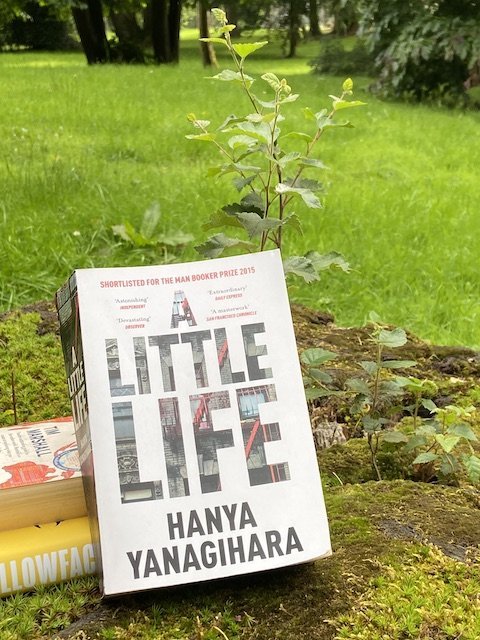
Polarising
Of all the books I've read and reviewed, I've never been more on the fence than I have with this one. On the one hand, it felt incredibly depressing and bleak at times, much too long and depressing ( I realise I said that twice).
On the other hand, parts of it, especially the initial sections, are completely immersive and it has a lot to say about the importance of love, of art, of friendship. And it will most likely break your heart a little, get under your skin, and I think that's a good thing too.
It's a book that has polarised opinion and I can see why. I am glad I read it and it's not taunting me from my bookshelf. I will never forget the character of Jude St. Francis, and I'm glad that this book challenged me - I think that's a good thing.
I think I would have to know you well before I could recommend this - only you know if you'd be able for it. Incidentally, reading it in an Irish summer didn't help, as the weather soon turned to shit.
If you've read it, please let me know below - I think I need to talk to someone after reading 'A little life'.
720 pages, Hardcover
Published March 10, 2015 by Doubleday
Amazon UKAmazon US
youtube
Hanya Yanagihara talks about ‘A little life’.
A Little Life Quotes
“You won’t understand what I mean now, but someday you will: the only trick of friendship, I think, is to find people who are better than you are—not smarter, not cooler, but kinder, and more generous, and more forgiving—and then to appreciate them for what they can teach you, and to try to listen to them when they tell you something about yourself, no matter how bad—or good—it might be, and to trust them, which is the hardest thing of all. But the best, as well.”
“….things get broken, and sometimes they get repaired, and in most cases, you realize that no matter what gets damaged, life rearranges itself to compensate for your loss, sometimes wonderfully.”
“Why wasn’t friendship as good as a relationship? Why wasn’t it even better? It was two people who remained together, day after day, bound not by sex or physical attraction or money or children or property, but only by the shared agreement to keep going, the mutual dedication to a union that could never be codified.”
“Who am I? Who am I?”
“You’re Jude St. Francis. You are my oldest, dearest friend. You’re the son of Harold Stein and Julia Altman. You’re the friend of Malcolm Irvine, of Jean-Baptiste Marion, of Richard Goldfarb, of Andy Contractor, of Lucien Voigt, of Citizen van Straaten, of Rhodes Arrowsmith, of Elijah Kozma, of Phaedra de los Santos, of the Henry Youngs. You’re a New Yorker. You live in SoHo. You volunteer for an arts organization; you volunteer for a food kitchen. You’re a swimmer. You’re a baker. You’re a cook. You’re a reader. You have a beautiful voice, though you never sing anymore. You’re an excellent pianist. You’re an art collector. You write me lovely messages when I’m away. You’re patient. You’re generous. You’re the best listener I know. You’re the smartest person I know, in every way. You’re the bravest person I know, in every way. You’re a lawyer. You’re the chair of the litigation department at Rosen Pritchard and Klein. You love your job; you work hard at it. You’re a mathematician. You’re a logician. You’ve tried to teach me, again and again. You were treated horribly. You came out on the other end. You were always you.”
"And who are you?"
"I'm Willem Ragnarsson. And I will never let you go.”
“He had looked at Jude, then, and had felt that same sensation he sometimes did when he thought, really thought of Jude and what his life had been: a sadness, he might have called it, but it wasn't a pitying sadness; it was a larger sadness, one that seemed to encompass all the poor striving people, the billions he didn't know, all living their lives, a sadness that mingled with a wonder and awe at how hard humans everywhere tried to live, even when their days were so very difficult, even when their circumstances were so wretched. Life is so sad, he would think in those moments. It's so sad, and yet we all do it.”
“Harold sighs. “Jude,” he says, “there’s not an expiration date on needing help, or needing people. You don’t get to a certain age and it stops.”
literary fictionContemporaryLGBTMental Health
3 notes
·
View notes
Text
morality in the world of good omens
so i wrote another (admittedly very messy) essay on good omens not long ago right after watching season 2 but after finishing that, rewatching all of both seasons multiple times, and reading through the book, i have a couple more distinct ideas to get out...somewhere...if only for my own sanity. this is me throwing my thoughts into the internet before i pop, if you will. just 3 sections, below the cut.
1. environment, characters, & transformative fandom creations
to start this post off a bit more broadly, i've been thinking a lot recently about transformative fandom and the reasons why we write fanfiction/create semi-original works in the first place, as well as why certain aspects of fandom (writing, art, analysis, etc.) will be more appealing to me for certain shows/series than others. correct me if you have a totally different view of this, but in my experience i've found that i tend to naturally gravitate towards different parts of fandom depending on what the original medium of the story was- podcasts tend to lead to some of the most interesting art trends, for example, since there's more room for interpretation and character design tends to be more of an ongoing community project than something set in stone like for a tv show with live human actors.
in my own observation, i've noticed that a lot of the really big & excitable fandoms, the ones that generate tons & tons of fanworks more naturally (a.k.a. just because of the story itself & not other factors like a pre-existing franchise or hype about new great gay representation, etc.) tend to surround stories that fall into a kind of "sweet spot" that makes the creation of fanworks really appealing. if you've ever wondered why there are so many ravenous artists bending over backwards to draw gorgeous fanart for stuff like homestuck or south park or even minecraft youtubers, it's likely because those stories all fall into a sweet spot for drawing, with character designs that are recognizable at a glance and yet still simple enough that there is plenty of room for personal creative touches. (think also, if you're familiar with such kinds of homestuck terms: hyperflexible mythologies, A4:1524, and/or this archive link cause the official thing is down now for some reason)
the conclusion i've come to is thus that even something as basic as the original medium of a story can dictate a lot about what kinds of fan activities are more common or popular within said story's fandom.
so, back to good omens- for me, this all relates back because of a question i've been messing with in my head recently, about why i've been less interested in fanfiction for good omens than i have been for the last few fandoms i've been, almost all of which have basically broken my ao3 bookmarks.
this question has been fucking with me for a while now, largely because i'm not entirely sure what's motivating it. a lot of times i can figure out pretty easily why i might personally not be interested in some parts of fandom, but that's not really the case here. from what i've seen this fandom seems to be pretty mixed in terms of age, & the writing that i have read is certainly no worse than i've seen elsewhere, perhaps even better in some places- and yet, i can't seem to get entirely into it, even getting frustrated as i can't find something to my tastes for an ao3 bedtime story as i've grown so accustomed. what caught me off guard is that this was an issue that i ran into while watching season 1 as well, back when the series was still quite popular but not blowing up like it is right now.
a lot of this may seem like (and likely is, at least in part) basic overthinking, but i mentioned it all here because the answer i eventually came to is reminiscent of my previous reflections above on the nature of fandom & how/why fanworks are created.
a couple paragraphs above, i used the example of art as an example of how fandoms that generate a lot of original artwork will often do the most when the original story falls into a sweet spot of character design, but notably i think that this sentiment applies to a lot more than just art. if you've ever seen the copious amounts of kpop & hockey rpf fanfiction that lives on ao3, it should be clear that this applies to writing too.
i wrote this essay a while back responding to an observation about the lack of a more extensive symbolic language in fanfiction & i've toyed around with the idea more since, particularly in considering the question of why a lot of what we see as the staples of fanfiction exist in the first place. in that post, my response largely revolved around an argument of why we create fanfiction- namely, that fanfiction is created as in tandem with deeper analysis of the original story/series, as a way of trying to practically apply character analysis to a new context.
the key part of that last sentence to me is how a lot of this revolves around character analysis (and shipping, but really it's the characters that motivate the shipping in most cases so. same difference).
i tend to instinctively separate fanfiction into two separate categories: fanfiction that is based out of the original world/canon of the story (including but not limited to fix-its, deeper analysis fics that take a scene & extrapolate from it, continuations, etc.) and fanfiction that takes the characters from the original story & plops them in an alternate universe/AU. while i separate these out as two distinct categories of fanfiction, i should also clarify that i don't think these two groups are necessarily equal in terms of number of fics- rather, the vast majority of fanfiction tends to be AUs, keeping the original characters & changing any & all aspects of the world around them. again, this may vary depending on the story & Vibe of the fandom at the time, stories like game of thrones or harry potter or homestuck might have a lot more in the canon category by nature of any major dissatisfactions the fandom has with how the original story was told, but in most cases AUs are more popular. this was a lot of the basis behind my argument that fanfiction is created as character analysis in fact, since the characters are the most important part that carries over from original story to fanwork, as well as can end up being one of the most debated/scorned parts when it comes to fandom drift (i.e. "that's out of character"/"he wouldn't do that"/and all other such arguments about fanon vs. canon characterization).
basically, my conclusion in this case was that i was a lot less interested in gomens fic largely because i have a really hard time separating the characters from the world in the case of this particular story. aziraphale & crowley being an angel & a demon and dealing with all of the bullshit of their world when it comes to heaven & hell are such integral parts of their characters in my mind that i have a much harder time getting behind AU fanfiction that plops them in a totally different context. it's just a much harder sell for keeping the characters in character for me. (i also tend to not like s2 fix-its just cause, idk they're just not my style, which is where a lot of the recent blast of energy has led us.) to clarify, this is not a judgement, just a matter of personal preference and a reflection of why, even if a lot of fandoms will look the same from the outside/involve the same things like art, fic, etc., an individual's mileage can vary wildly when it comes to how they interact with different things online.
*additional note, also for clarification: i do want to acknowledge that a lot of this depends on pure popularity as well, popular fandoms will often end up with basically everything in terms of fanworks just by nature of how many people are interacting with & thinking deeply about the story. my point here is more along the lines of the fact that even within the more well-populated fandoms, certain types of fanwork will often Stick Out more to me than others, or even be visibly much more common than in other fandoms, due largely to the original medium/structure of how the story.
so, speaking of aziraphale & crowley in more depth now- why does the world of good omens feel like such an integral part of their personalities when it comes to characterization? up next, let's talk about morality within the context of good omens' perhaps surprisingly secular take on heaven & hell.
2. the amorality of heaven & hell (ft. the crowley quote apples you know the one)
(warning in advance that this section may be a bit limited since i'm not going to get super far (or very far at all, really) into the whole religious-analysis aspect of good omens.)
i've been binge-reading the original pterry & gaiman book for good omens over the last few days and it's been very fun seeing all the slight changes between the tv show & the original. you can really see the hand of the original creators in how the tv show was translated, even just by looking at which parts made it and which parts were deemed worth cutting out. i suppose having one of the original creators right there helping build everything really helps make a book -> show translation work, since the ASOUE tv series was also pretty well received- something about knowing what's the core of the series & truly important to keep in, and having more time to tell the story itself?
anyways, i have a short list of notes that i've been taking as i read, conversations that stand out to me or footnotes that particularly amused me, but i keep coming back to one line that stood out to me quite early on. in context, this line comes from crowley during the conversation where he is first attempting to fully convince aziraphale about stopping armageddon, specifically when they're talking about exerting equal forces on warlock to make him normal:
"You're saying the child isn't evil of itself?" [Aziraphale] said slowly.
"Potentially evil. Potentially good, too, I suppose. Just this huge powerful potentiality, waiting to be shaped," said Crowley. He shrugged. "Anyway, why're we talking about this good and evil? They're just names for sides. We know that."
(pg. 67)
"They're just names for sides." if i had to pick one line to sum up the view on religious morality of this series, this would likely be it.
on the one hand, i tend to interpret a lot gomens' take on heaven & hell within the context of its political stance, something that is particularly obvious through a line from gabriel in s2e2 where he tries to clarify to aziraphale that heaven isn't trying to hurt job directly, but instead is just not stopping hell from doing horrible things to him. while there may be some additional nuance to add to this take within the context of british politics that i don't really know well enough to add about, i'm inclined to see this from the side of my own familiar american politics, which might hold some weight considering how long mr. gaiman's lived around here. point is, my current interpretation of that line is that it helps in more clearly establishing the analogy of heaven & hell as the story moves forward into newer seasons and thus more contemporary politics, equating heaven with mainstream liberal politics & politicians and hell with conservatives.
this stance seems to be emphasized even more in the tv show than the book which makes sense considering its been coming out more recently, and especially in season 2 which is still quite caught up in a lot of quarantine-based reflection. (the tv show puts a lot more emphasis on heaven & hell in general, actually, perhaps initially a byproduct of actually being able to see those environments in their entirety and all the angels & demons that populate them- but we'll get to that.)
the book takes a slightly different stance that, fittingly, seems more reflective of the time it came out. in particular, i was struck a lot more when reading the book by adam's rise (fall?) to power, and how much of it was motivated by a burgeoning nervousness/pessimism about climate change and the anxieties of younger generations that comes with inheriting an earth that feels so fucked up. honestly if anything it's only gotten more relevant in that respect, what with the current vibe on the internet & the hopelessness of the doomer gen z gang, but it also has a distinctly different flavor to me from the tv show, which i think is largely because it's less connected to Formal politics since again we see a whole lot less of heaven & hell as such distinct, bureaucratic entities.
instead, there is a very distinctly amoral aspect to heaven & hell that we get through lines like the one above and especially from characters like crowley. this is why i argue that good omens, despite having so many religious elements, is such a deeply secular take, especially when it comes to its ethics & morality- Good and Evil, notably with the capital letters in this case, has very little to do with actual actions and much more to do with the name that you stamp on top of said actions. heaven & hell and the angels & demons that we see directing and watching and generally fucking with aziraphale & crowley throughout the story are distinctly separate from humanity, and as we see even more as the story progresses, distinctly unaware about what it even means to be a human, in both a deeper philosophical & very basic and literal sense. Good and Evil is simply another name for the sides- and thus the true ethics is something separate, and based in a deeply human experience.
in my opinion this is also why aziraphale & crowley, lovers of humanity and also to some degree spokespersons of it from how much they've "gone native," tend to be so deeply at odds with both heaven & hell and always end up agreeing with each other over their own supposed sides. what makes aziraphale & crowley so distinctly different is that they ascribe to the same ethics & morality that humanity does, or at the very least are trying to figure out ethics & morality & How to Be a Good Person in the same horribly messy way that humans do, separating them from the black & white "this side Good & this side Bad," logic that the rest of heaven & hell instinctively ascribe to.
there's a lot of nuance here, which is also why i think there is such an emphasis on moral ambiguity (and love, but we'll get to that) throughout season 2. the story of job, grave robbing, & questionable attempts at matchmaking- aziraphale is working through a lot of Shit right now when it comes to trying to figure out what the Good thing actually fucking is, and i think it's key that a lot of that is motivated by crowley himself. crowley might'e been cast out of heaven for asking too many questions, but aziraphale is there & listening to them & giving them the serious thought they deserve, and that can't be overlooked.
sidenote: i couldn't figure out a place to shove this in, but i also wanna point out that a lot of this is tied to the idea of growing over time too. on the same page as the quote transcribed above is another line from crowley leading up to aziraphale's question that puts a lot of emphasis on the fact that warlock is going to be a product of nurture, not nature. again, this is an argument against basic black & white assigned-at-birth morality for the ability of humans to grow & change over time and be influenced by the people around them.
it's notable that despite adam's supposed origin as a Son of Satan, what really gets him to stop the apocalypse in the end is the fact that he doesn't really give a shit about all this big plans but instead just wants to hang around his friends. there's a lot of emphasis in the book placed on how beautiful & nice tadfield is as a place for a young kid to grow up, how well loved & fiercely protected it as as something beloved to adam. while he might be overwhelmed when faced with the full picture of how horrible the world can be, ultimately what he cares about is loving & taking care of the people & places that he grew up learning were precious, and the only way to do that is to keep growing & changing yourself within that world and trying to help it also grow into something better, not throw it all away just for the slightest chance that you could restart. a message worth taking the time to think about, at the absolute very least.
3. finding morality w/in humanity: crowley & aziraphale and speculation for s3
i have complicated feelings about both aziraphale & crowley throughout a lot of the show and especially in season 2. i think a lot of people, myself included, are inclined to see crowley as the voice of reason in this season, and for good reason- as i mentioned before, a lot of aziraphale's deeper questioning of the status quo and goodness (Goodness) as a whole is motivated by questions from crowley.
i kiiind of mentioned this in my previous essay, but to state it more clearly, my take on crowley is that he's arriving at the right answer for the wrong reasons, and, conversely, aziraphale is arriving at the wrong answer for... kind of also the wrong reasons but also slightly for the right reasons. let me explain.
crowley is clearly much more aware of the flaws in both heaven & hell than aziraphale is, which seems to be the basis behind a lot of his motivation in asking aziraphale so many questions in the first place. he's also, as maggie & nina point out in s2e6, deeply lonely, often running away or getting ready to fight literally anyone that isn't aziraphale (or humans, but that's a little more complicated). from his reaction to beelz & gabriel getting together, i think it's pretty clear that he still hasn't entirely given up on the whole alpha centauri idea, and it makes sense- as i said in that last essay, crowley basically won the argument at the end of the previous season when it comes to aziraphale & crowley, "making [their] own side," so he doesn't have much reason to face any of his personal fears until maggie & nina basically point out that they exist directly to his face. once they do point it out, however, he's very motivated to act & does so almost immediately, even after hearing what aziraphale has to tell him and being pretty thoroughly devastated by it.
my point here is that crowley is correct in seeing the toxicity of both heaven & hell, he's just flawed and largely motivated by fear (up for debate if that's all it is, but i certainly think it's a big part of it) in his desire to run away from it all. it's not quite armageddon, again he's going more flight > fight here, but he's still ultimately giving up and that's not a great conclusion.
on the other hand, as some others on this site have pointed out, aziraphale is certainly showing a lot of strength in his willingness to keep fighting & try to change things for the better, but it's not hard to see how that belief has been twisted. one of aziraphale's biggest flaw in motivation at this point imo is that he doesn't just believe in goodness but Goodness, the kind that's tied to heaven always being right & all actions being morally Good so long as they're done under the name of heaven, and that clearly also isn't great.
thus what i think the both of these two really need ultimately is that deeper connection to humanity, and the ethics born from humans interacting with humans. we can already see how strong these two are when they collaborate, even when they're doing their absolute best to be as subtle as possible, but what i think they need is to once again be grounded by humanity, not to get so caught up in the bullshittery of heaven & hell and Good & Evil, but once again find a goodness defined by the world that they mutually love so much and stick with it.
i keep tossing a question around in my head about whether or not aziraphale & crowley are going to end up human by the end of this series. it feels natural that they would, they're already so at home and in love with earth & around humanity, but i'm also not entirely sure if that would be a happy ending for them considering how long they've watched & loved the world as it's changed. perhaps taking this post into account is another push towards humanity as a happy ending, not running away to a cottage to get away from the world (i just can't see running away to a cottage to be together as as happy ending, sorry- it might work for beelz & gabriel but not for aziraphale & crowley), but choosing to settle down within that world that is so dear.
#'just three sections' LAFFS. YEAH#astronaut rambles#good omens#gomens#no but i like this one a lot better than the last attempt at a gomens essay#this one feels a lot cleaner. more focused?#got a bit sappy at the end but i don't mind humanity is always worth loving#also off topic but i read this really interesting paper at work the other day#about pratchett’s writing in discworld & zizek & religion#forget what it’s called now but it was an interesting take on how fiction/fantasy can allow for deeper insights/reflection of reality#got some discworld books today so looking forward to reading those once i slurp up the last hundred or so pages of good omens#also thanks to my dad for having some interesting commentary on the job interpretation in s2e2 today#i all but literally slept through sunday school so i think a lot of the more noteworthy religion takes in this show go over my head =3=‘’#man i am so very much looking forward to how season 3 continues this story#i feel like a lot of the big conclusions there are really gonna be important for the direction of the story’s main message#season 2 is just. such a transition season it’s hard to get super distinct conclusions sometimes#like it’s still going somewhere there’s shit developing#it’s not like sherlock where it just teases deeper meaning forever but gives you nothing#but. it’s just so obviously Not Over Yet and I Need More#anyways much love i need to go to bed now arghfjdkd lots of shit to do in the future but all i wanna do is keep writing gomens essays. sigh#brainrot central#oh yay my phone’s at 69% now ☺️ wheeee#good omens meta
7 notes
·
View notes
Text
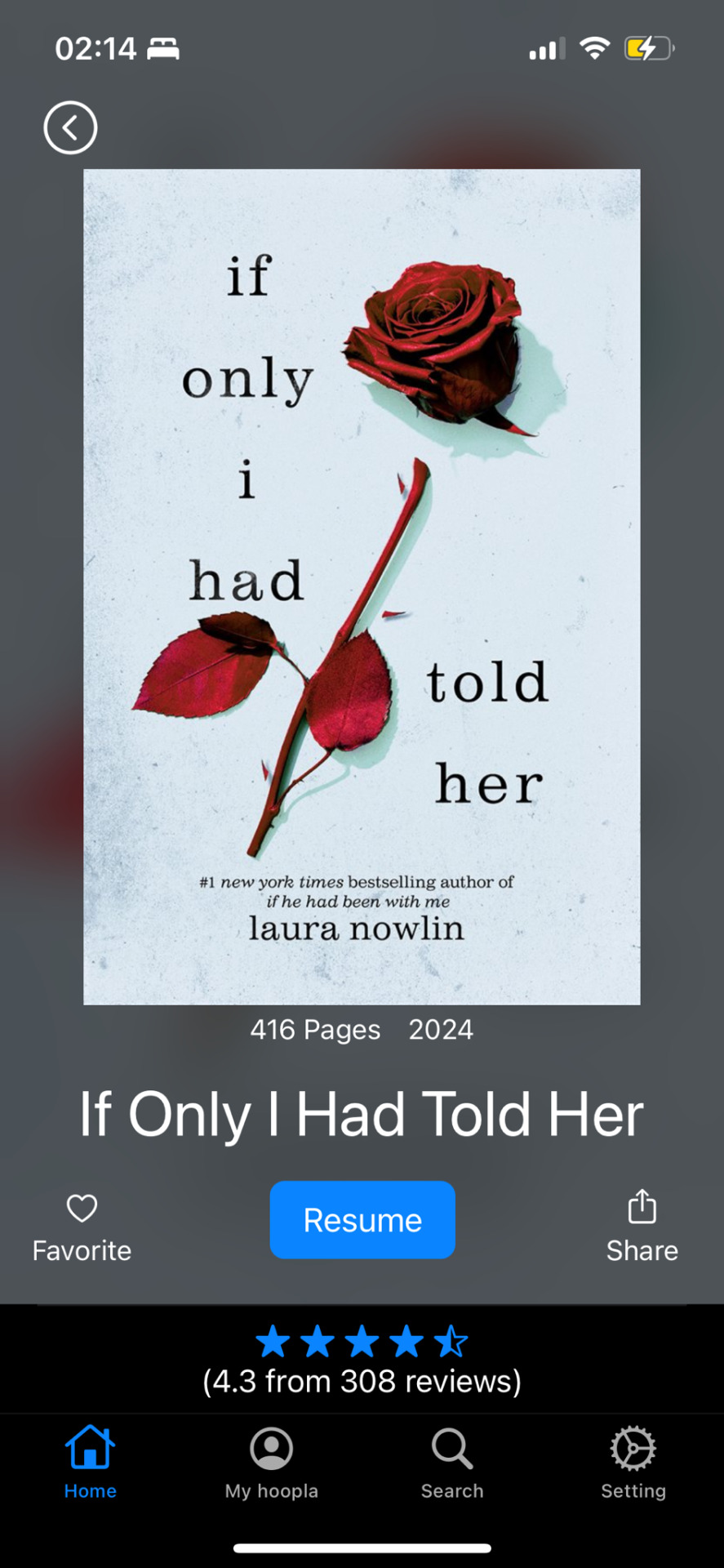
Ohhhh man!!! Honestly I had a hard time getting into the first book. Initially I just didn’t care about what the character was going through. But I stuck it out because everyone said the ending was heart wrenching and I love a good cry. Idk what was up with my life at that time but I didn’t cry (and I’m usually a cryer) yet I was kinda disappointed the story was over.
But this one. Oh mannnnn. Im reading through teary eyes. And have definitely full blown cried in some parts. And of course after book 1, I am invested in the characters stories.
It’s really late and I have 15% of the book left to read and I’m forcing myself to go to sleep but just had to share this book that’s so 100% worth the read.
2 notes
·
View notes
Text
In an attempt to feel festive, I got this book to read each night in the lead up to Christmas. Tonight I felt my heart swell a little when I cracked it open for the first time & found this as the dedication.
To all my fellow fic writers, if you needed proof that you are seen & that your work matters... here it is.
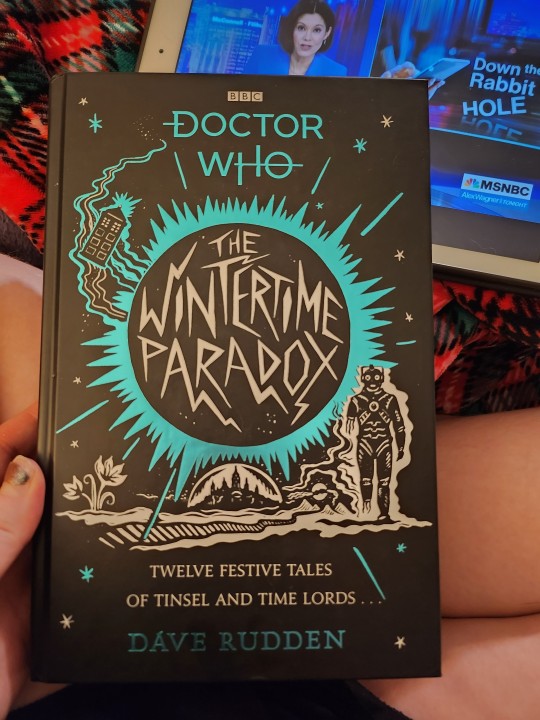
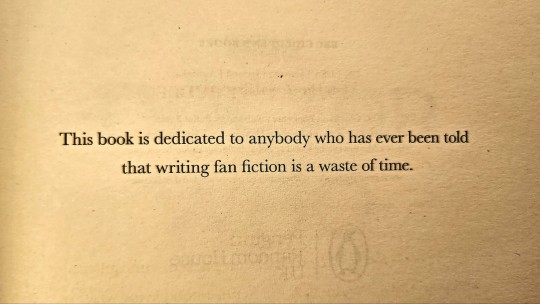
Happy holidays, everyone ❤️ cheers 🥂
#its a sign#no such thing as coincidence#holiday reads#your writing matters#hey you you're awesome#doctor who#the wintertime paradox#fan fiction writers#to my fellow writers#keep writing#you work is worth it#fan fiction is real writing#happy holidays#made my grinch heart swell#doctor who books#fan fiction is not a waste of time
23 notes
·
View notes
Text
me, a year ago: non-fiction? no thank you, I’d rather not
me, now: another book about decolonisation and historical injustices? don’t mind me if I do
#all fiction feels boring#also nothing is really worth the attention#so yeah will read a dudaev book after historical fiction after I finish the collection of essays on ukr-russ cultural relations
11 notes
·
View notes
Text
Making a list of the books I read this year, and the Range of shit is so funny bc on one hand I’m like ‘hmm idk if I’ll count the Animorphs, they’re only like a hundred pages each and I just read them for a bit of fun’ (as if I don’t read books in general, for a bit of fun) and then also I’m like ‘wow idk if I can put Worm on the list since it’s kind of its own thing and also unfathomably long’
#also not definitely counting graphic novels#the reason I’m counting at all is I wanted to see how much I cld read if I properly got back into it#past couple years I would just reread stuff a lot bc books r expensive and I got thru most everything interesting at my library#anyway then in surgery recovery I read loads and that was in December so it was a perfect time to start counting in the new year#I go to a library that’s bigger and further now#and get cheap second hand books#and also just buy lots new when I can! bc it’s worth it to me tbh and new fiction is so exciting rn#misc
4 notes
·
View notes
Text
My favourite quotes from "The Left Hand Of Darkness" by Ursula K Le Guin
My efforts took the form of self-consciously seeing a Gethenian first as a man, then as a woman, forcing him into those categories so irrelevant to his nature and so essential to my own
Page 12
⎯⎯⎯⎯⎯
"That he will: what does a man die of but his death?"
Page 45
⎯⎯⎯⎯⎯
"You don't see yet, Genry, why we perfected and practiced Foretelling?"
"No-"
"To exhibit the perfect uselessness of knowing the answer to the wrong question."
Page 70
⎯⎯⎯⎯⎯
"The only thing that makes life possible is permanent, intolerable uncertainty: not knowing what comes next"
Page 70
⎯⎯⎯⎯⎯
When you meet a Gethenian you cannot and must not do what a bisexual naturally does, which is to cast him in the role of Man or Woman, while adopting towards hima corresponding role dependent on your expectations of the patterned or possible interactions between persons of the same or the opposite sex.
Page 94
⎯⎯⎯⎯⎯
One is respected and judged only as a human being. It is an appalling experience.
Page 95
⎯⎯⎯⎯⎯
He was a hard shrewd jovial politician, whose acts of kindness served his interest and whose interest was himself. His type is panhuman. I had met him on Earth, and on Hain, and on Ollul. I expect to meet him in Hell.
Page 116
⎯⎯⎯⎯⎯
It is not altogether a bad thing to have criminal ancestors. An arsonist grandfather may bequeath one a nose for smelling smoke.
Page 143
⎯⎯⎯⎯⎯
It is a terrible thing, this kindness that human beings do not lose. Terrible, because when we are finally naked in the dark and cold, it is all we have.
Page 170
⎯⎯⎯⎯⎯
"He loved his country very dearly, sir, but he did not serve it, or you. He served the master I serve."
"The Ekumen?" said Argaven, startled.
"No. Mankind."
Page 293
#ursula k. le guin#the left hand of darkness#scifi#sci fi novels#speculative fiction#reading#books#book quotes#quotes#reflective#currently reading#science fiction#queer#bisexual#genderfluid#gender#seriously give this a read#its tough to get through in the first part#but worth it#also follow me on storygraph#my @ is bl4m3s#queer fiction#book recommendations
9 notes
·
View notes
Text
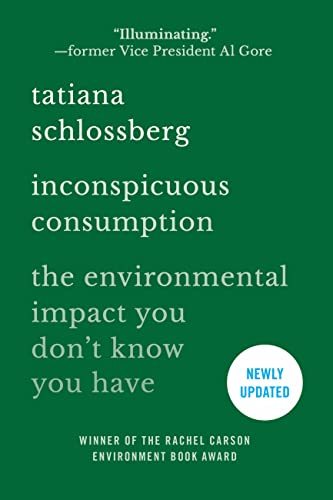
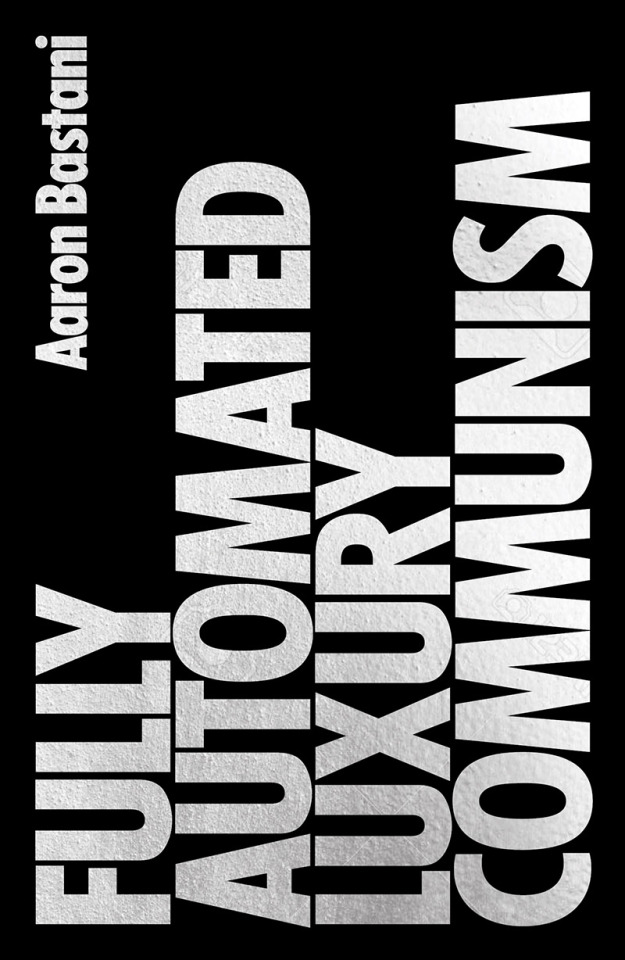

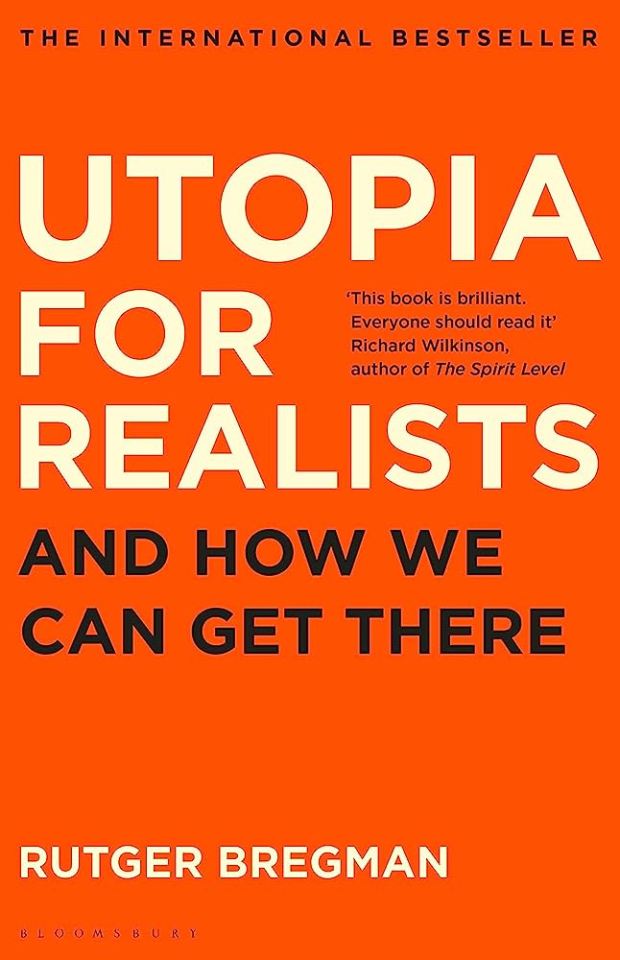
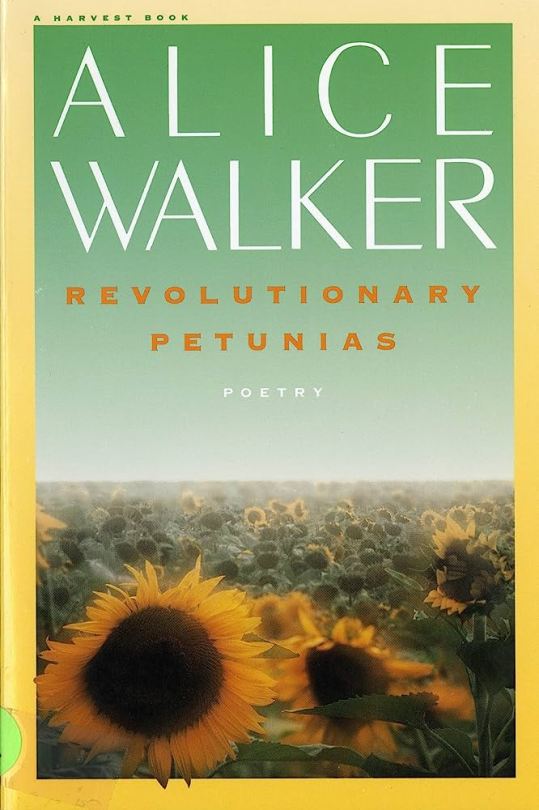

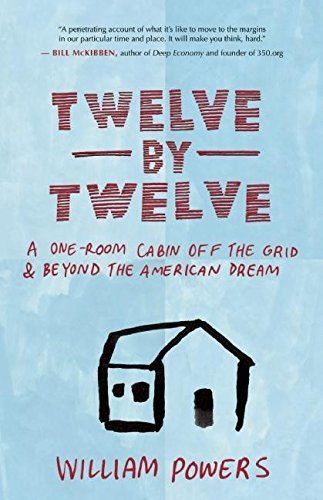

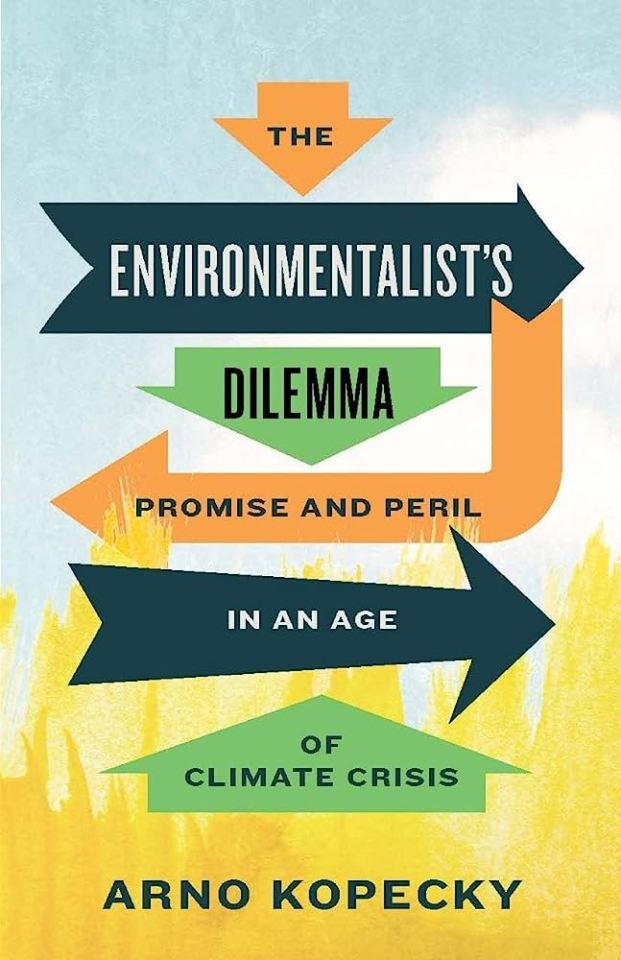
Books Read in 2023:
Inconspicuous Consumption: The Environmental Impact You Don't Know You Have by Tatiana Schlossberg (2019)
Fully Automated Luxury Communism: A Manifesto by Aaron Bastani (2018)
You Suck, Sir by Paul Bae (2014)
Utopia For Realists: How We Can Build the Ideal World by Rutger Bregman (2014)
Revolutionary Petunias by Alice Walker (1973)
Girl with the Pearl Earring by Tracy Chevalier (1999)
Twelve by Twelve: A One-Room Cabin Off the Grid & Beyond the American Dream by William Powers (2010)
Windfall: The Booming Business of Global Farming by McKenzie Funk (2014)
The Environmentalist's Dilemma: Promise and Peril in an Age of Climate Crisis by Arno Kopecky (2021)
[ID: Covers of aforementioned books. End ID.]
#SUPER loved inconspicuous consumption it was just v informative all around#i have it physical and will b keeping it#fully automated was an interesting thought experience ig? it was a book.#you suck sir was a v quick and lighthearted read of a teacher sharing his stories#utopia was very much like arguing for social democracy and so in terms of that it was v solid#tbh i would rec this book as a good one for like. liberals in ur life#not a difficult read and tbh im gonna get my mom 2 read it#petunias very very good book of poetry#pearl earring is a fictional story of how that painting came to be#i enjoyed it! the prose was very well written!#twelve by twelve was SO bad i literally couldn't finish it and the author is racist and just. dont touch it#windfall was difficult to get through sometimes but VERY worth it i found it informative and also just.#make me so fucking aghast#environmentalist dilemma was....... a book. it started out very strong and i was absolutely hooked and thought i'd love it but then it wen#t downhill. i found it quite informative and interesting in parts for sure#but the author is more centrist than i am and that comes across QUITE a bit and theres a lot about like. his own opinions and stuff#the straight up reporting the facts parts were interesting but not his own opinion i just wanted him 2 be quiet#2023media#gigi.txt
2 notes
·
View notes
Text
buying a couple of books for me and there's not a single fiction book on the pile ..... like, idk does the desire to read fiction ever come back 😵💫
#the last fiction i read was star wars novels but even that i didn't care for much except for rots#it's just so hard to know whether i'll like a fiction book or not or. even if i don't like it#whether it will be worth reading#w nonfic if i'm interested in the topic there's a 90% chance i'll be interested in reading the book
1 note
·
View note
Text
the hardest thing for me as an autistic person of color is the idea all autistic people were/are book worms, and that the idea of autistic people of color not fitting into that is shameful and bad and proves things about us and our cultures,
that ever speaking on struggling with reading and how long it took me to read and spell and feel like i wasn’t a stupid mutt like people said is just a return of being called it again by white autistic people who are lit majors who scoff at the idea of me not reading 20+ books a year,
they won’t call me a stupid native mutt but i know they think it and that’s a tough thing about being around autistic spaces which are overly run by white autistic people who look down on any other autistic person who struggles more then them and can’t prove they aren’t a useless autistic to people like they can in the vain unreal goal to be approved by a world which will toss them aside the moment they crack,
i’m not stupid, i am smart, i learned so much oral history during my life and i learned to be kinder to be stronger by my elders and that’s not useless,
#mel talk's#it always leaves me feeling hollow because i can't read much outside of actually historic history of bipoc#i just can't dive into fictional books well or classics as easy and it drives me nuts the idea of me struggling with these means i am not-#worth it like i know why their blue but because i learned in a real life since instead of reading it no one cares#the idea bipoc need to do what white people do to be worth the time of day is unfair and i just idk#this is a pointless rant i guess because it won't change for me#and it twists me up inside that i never can be respected because i learned differently
4 notes
·
View notes
Text


“It’s the great mystery of human life that all grief passes gradually into quiet, tender joy. The mild serenity of age takes the place of the riotous blood of youth.”
#books read in 2022#bookblr#books#book photography#book blog#reading#bibliophile#fiction#the brothers karamazov#fyodor dostoevsky#dostoevksy#dmitri karamazov#ivan karamazov#alyosha karamazov#long read#worth it#amazing#story telling#beautifully written
10 notes
·
View notes